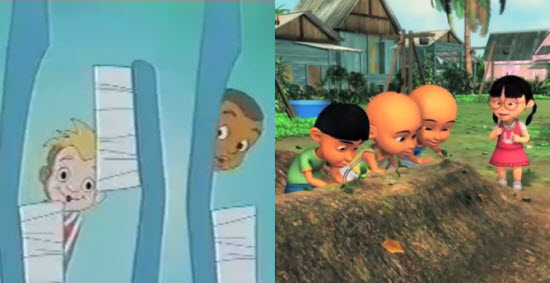What You Must Know to Work with Kid Voice-Over & Dubbing Talents

5 Tips for Subtitling Foreign-Language Video Footage for Editors
August 29, 2018
Glossary of Voice-Over Localization & Dubbing Terms (Free PDF)
September 12, 2018Working with kid voice-over and dubbing talents – that is to say, with minors – can be particularly difficult. But TV shows, films, video games and animated series often require casting and recording kids. Multimedia localization professionals must have a basic idea of what it takes to work with minors to ensure the success of these kinds of projects.
This post will list what you must know to ensure successful voice audio sessions with kid talents.
[Average read time: 3 minutes]
Additional challenges to voice-over, dubbing & casting
On most voice and dubbing projects, kid characters are performed by adult voice-over talents and actors. These actors are usually younger themselves (though not minors), or are particularly good at higher pitches – in fact, they often specialize in this particular skill. This is common practice because it’s most cost-effective, and because it generally works quite well. As an example, the voice of Bart Simpson is performed by an adult talent, the incomparable Nancy Cartwright, and so are the voices of a lot of kid characters in cartoons.
That said, kid talents are still requested regularly on entertainment localization projects like TV shows, films, video games and animated content. As a matter of fact, this is quite common in content created for kids. So it’s critical to know the basics when working with minors on voice-over and dubbing projects.

Let’s jump right in.
1. You must follow the applicable labor laws – which can be quite strict.
This is true of working with adult voice talents and dubbing artists, of course. But when it comes to minors, the laws are more restrictive, and penalties for not complying with them can be quite onerous. They cover everything from how long a minor can work, to what provisions must be made for their education, as well as who must be present during any sessions. To make matters more difficult, laws may vary depending on the actual age of the child – meaning that if you have a cast with a wide range of ages, you may have different restrictions on each talent. No matter the specific local laws, projects with kids almost always require more pre-production and longer timelines for this reason alone.
2. Kid talents don’t have the same abilities as adult talents.
Moreover, it’s critical to know in which ways exactly.
- Stamina and concentration. Kid talents need breaks, play session, or other kinds of regular pauses. Aside from the laws governing session length, most kids just can’t concentrate as long as adults.
- Reading ability. Many kids are not able to sight-read – especially if they’re younger talents. Make sure to take this into account when casting voice talents and planning timelines.
- Dubbing ability. This skill is developed through years of experience – especially lip-sync. And even then only a subset of dubbing artists really master it. Most kid talents won’t be able to do it easily, especially on live-action projects. Keep this in mind for video localization projects.
That’s not to say that you can’t record long scripts or dubbing projects with kid talents, but you may have to develop creative workflows in the recording studio, depending on your content. In short, it’s critical to budget and schedule realistically around a kid talent’s ability.
3. You’re casting their parents or guardians as well.
A parent or guardian must be present at all times during most sessions with minors. That means that parents will be a factor in the production. In fact, it’s common to say that when casting a kid talent, you’re also casting their parents. And of course, that means that productions must take parent schedules into account as well as school schedules – which invariably leads to longer timelines.
4. Kid’s voices change – sometimes suddenly.
Kid talents’ voices will change as they grow. Of course, this is most marked around puberty, but it’s still a factor at any age. Keep this in mind when casting long-term projects. For live-action TV show dubbing, for example, it’ll make sense that your kid talents grow and change as the actors on the show age as well. On animated series, in which characters usually stay the same age, your talent’s voice change may be jarring. Keep voice change in mind when casting long-term projects, or ones that may require pick-ups.
Plan for longer – and more volatile – post-production timelines
Production will take longer. Timelines will have to work around schooling. Costs will increase, possibly significantly. And, of course, the entire multimedia localization process will be a little harder to pin down. But there are ways to ameliorate this. During project development, limit the amount of content per kid talent if at all possible. Keep talent ability in mind when casting, especially for longer roles that require cold-reading, dubbing, or any other technical skill. Plan around kid talents potentially aging out. Assign someone in the studio to ensure that all labor laws are followed diligently. And finally, make sure your vendor studio provides a professional, experienced voice-over and dubbing director. (JBI Studios provides a native-speaker, professional director on all productions, of course.) Kid talents can be a great value-add on productions – but only if you plan rigorously to ensure that their studio sessions maximize schedules and ability.

